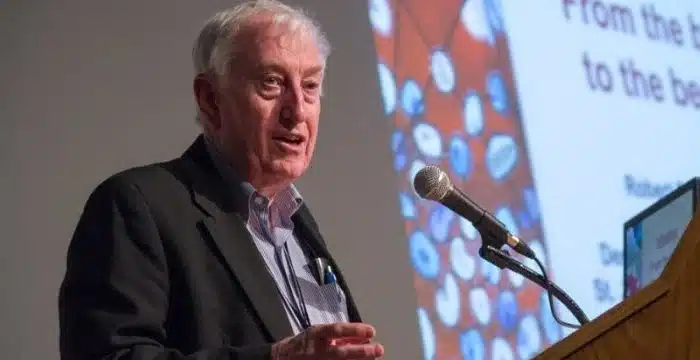Unmasking a Legend: The Story of Peter Doherty

Peter Doherty is an Australian immunologist. He was awarded the Nobel Prize in Physiology or Medicine in 1996.
Life and Career
Peter Doherty was born on 15 October 1940 in Brisbane, Australia. He received his education in veterinary science at the University of Queensland, where he earned his Bachelor of Veterinary Science in 1962.
Doherty’s career in immunology took off when he moved to the United States to pursue further studies. He completed his Ph.D. at the University of Edinburgh, Scotland, in 1970. Later, he worked at the John Curtin School of Medical Research in Canberra, Australia. However, his most significant contributions came during his time at St. Jude Children’s Research Hospital in Memphis, Tennessee, where he collaborated with Swiss researcher Rolf Zinkernagel.
Together, Doherty and Zinkernagel made a groundbreaking discovery in immunology. In 1973, they identified that T lymphocytes (a type of white blood cell) were responsible for recognizing and attacking virus-infected cells. This discovery earned them the Nobel Prize in Physiology or Medicine in 1996. Their work significantly advanced our understanding of how the immune system functions and how it responds to viral infections.
Doherty’s research also extended to topics like transplantation and autoimmune diseases, contributing to the broader field of immunology. Peter Doherty continued his research and became an influential figure in the scientific community. He served as a professor at several universities, including the University of Tennessee, the University of Melbourne, and the Australian National University.
Award and Legacy
Peter Doherty, along with Rolf Zinkernagel, was awarded the Nobel Prize in Physiology or Medicine in 1996 for their pioneering work on the immune system’s recognition of virus-infected cells. Their research significantly advanced our understanding of how the immune system identifies and combats viruses.
In recognition of his outstanding contributions to science and medicine, Peter Doherty was knighted by Queen Elizabeth II in 2007.Doherty has received numerous other accolades and honors throughout his career, including the Japan Prize, the Florey Medal, and the Prime Minister’s Prize for Science, among others.
Doherty’s research, along with Zinkernagel, clarified how the immune system recognizes virus-infected cells. This understanding has had a transformative impact on immunology and vaccine development. Doherty’s work has provided crucial insights into the development of vaccines, including those against infectious diseases like influenza, HIV, and COVID-19. His research has implications for the design of effective vaccines.
As a scientist and educator, Doherty has trained and inspired numerous young researchers, contributing to the growth and progress of immunology and biomedical research. Doherty has been an advocate for science and evidence-based decision-making, emphasizing the importance of scientific research in addressing public health challenges.
Observer Voice is the one stop site for National, International news, Sports, Editor’s Choice, Art/culture contents, Quotes and much more. We also cover historical contents. Historical contents includes World History, Indian History, and what happened today. The website also covers Entertainment across the India and World.
Follow Us on Twitter, Instagram, Facebook, & LinkedIn

